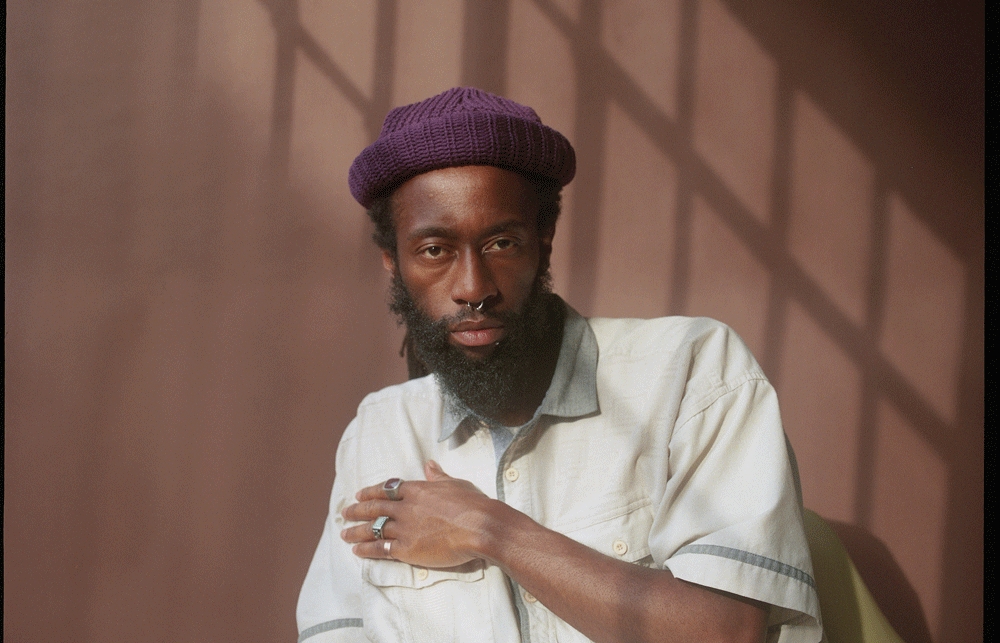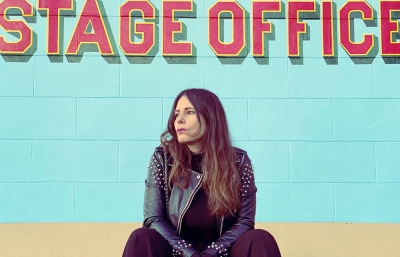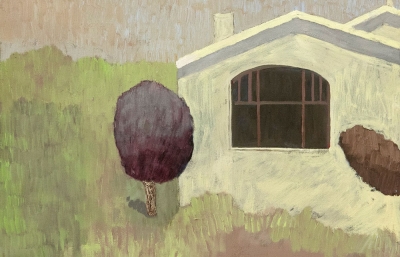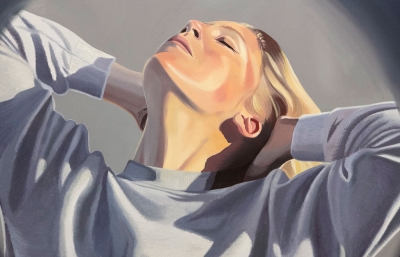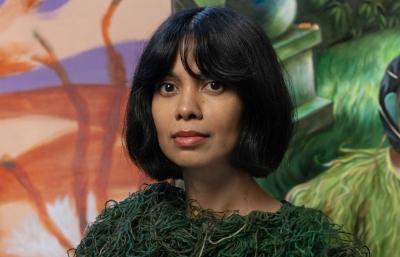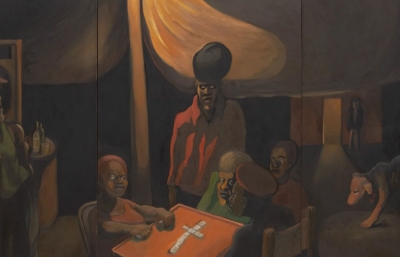Lenworth McIntosh
Life as an Open Studio
Interview by Yétúndé Olagbaju // Portrait by Mancy Gant
Lenworth McIntosh Jr. is a strong name. So is Joonbug. As with many, these names are the residuals of complicated history for my friend and prolific artist Lenworth “Joonbug” McIntosh Jr. I know him as “Joonbug”—a common and endearing nickname for “Junior”—but his full name belonged to his father. Joonbug's reclamation of his full name was significant, due to their relationship, complicated by space, harsh memories and an eventual death. It represented an acceptance of his own greatness and destiny.
Since meeting Joonbug in 2014, we have been in a collective, in friendship, and solidified an artistic trust that feels generative, empowering, and uncommonly authentic. Rarely seen without a camera and a sketchbook, his characters are among his best creations. Alive, dancing, vibrant, and sometimes a bit mischievous, these characters feel familiar, familial even, and embody a sense of timelessness in their composition.
Through The Stories I Tell Myself, I practice remembering. A focused dancer wearing a dark chartreuse dress reminds me of photos of dancers from the Black ballrooms of the Harlem Renaissance. A group of youngsters with caps and sharp fashion sense take aim in a sunny, cinder block-lined backyard. Their chicken companion squawks off frame, at what is sure to have been a strike. The scene reminds me of times I’d meet friends at the creek to practice our aim with rocks and pop cans. The self-assured stance of the gentleman in the mustard-yellow suit pulls memories from my own family photo album. My grandpa, posted up out front of the house, dressed dapper, in Philly, next to a tan sedan.

”Soul Shakedown Party”
A woman sits down at her breakfast table with both chicken and egg, while grinning dogs are in the corners of the dancehall. However familiar some of these scenes feel to me, it is clear that these characters, scenes, people are definitely Joonbug’s. They derive from insight that could only come from the blessing of being able to view experiences in hindsight, insight that crystalizes into memories. That morphs into lessons.
The Stories I Tell Myself is vulnerable and honest in its recalling of those memories. The works elongate time and welcome moments of introspection for Joonbug regarding his childhood and its influences. Both a love letter and examination, The Stories I Tell Myself doesn’t offer a side to choose but rather a space to reflect on them.
Joonbug and I started with the small stuff on a sunny Tuesday morning: his recent move, a carved wooden spoon, and furniture ideas for his new place. Eventually, I jump right into it.

Yétúndé Olagbaju: So tell me what were some of the broader inspirations and intentions with the exhibition? What was your process, and how did it feel?
Lenworth “Joonbug” McIntosh: At first I just had large canvases that were blank and I was going back and forth between feeling really confident in being able to work with them and also feeling as though this was going to take a long time. The feeling of "I can do this'' came from my experience creating murals, and with that I wasn’t intimidated by size. But then the time started becoming reality to me and I remembered how a mural is performative, you know? People come by, they watch you, they ask questions while you're up on the scaffolding. You have a set amount of time to finish it, and get it up. You're getting house paint, which can cover a huge surface area. You can get your colors mixed to your liking. There's all these different things to make the job go by smoother and quicker. But with oils, I knew they were not just gonna glide over this canvas, especially when getting things blocked out, which took forever. I learned even more about underpainting through this process, and by the last two or three paintings, I really understood it. In my mind, the last and largest painting looks completely different from the other ones because of that. They all kind of fit in the same family, but to me, I can tell that this large painting was the jump off point.
Which was the final one in this series?
The final one was the Soul Shakedown Party. That was just an accumulation of my learning throughout that whole show process. And then concept wise, if you can envision jumping into the skin of your younger self. I guess I imagined myself, in my younger body, going through life in this eight-year span (but really like four years) that was like the major breadth of everything. Looking at myself, looking at the world, and the act of looking up because I was so short and young. I was attempting to recreate these memories completely from the vantage point of my younger self. And some of the scenes in the show, I couldn't just paint those as my older self. I had to honor how my younger self would have seen them. So, if I'm walking into a space, I'm not going to be eye level with these adults. I'm going to be looking up at these people. I'm going to be eye level with some of the animals, you know. That vantage point is so different because it just creates this conversation of, like, I'm experiencing this. I'm learning this but I don't know fully what is going on. I know I'm in this, that this is part of my life learning, but then there's these adults who are way more advanced than I am. But I'm a child so I'm also soaking up everything. I'm just a sponge in this arena.

”Every Ghetto Yute Wahn Fi Play Gangsta Role”
I really am interested in hearing about that demystification, that push and pull between wanting to keep some things mysterious and secret and wanting to shine a light on some of these experiences you reference. It seems like you are engaging with a kind of fantastical way of examining childhood memories and examining your relationship to Jamaica. Can you talk about this kind of engagement with your memories? Is this body of work a desire to recall memories as they actually were? Or are you searching for something else?
Whenever I went back to Jamaica in 2017, there was a seed that was planted because this incredible snap happened. I hadn't seen the home where I grew up for almost 18 years. When I went back as an adult, as soon as I arrived at the entrance to the neighborhood, things started just flooding in, almost unlocking. Memories that were suppressed just keep coming up and bubbling to the surface. And, in vivid detail, I was telling people who had forgotten about the memories, and there was something about that. There were remarks like, "How are you remembering all of these things?” and “You haven't been here in so long!" Being thirty at that time, and just being in an age where I was able to have retrospection and time to reflect was that this was me, myself at this stage. This plot of land that I thought was massive is actually walkable now.
I love that. How the land seems to change according to your impression. You probably felt so massive then!
Yeah! I did. I was physically taller than everybody else too. That's a nod to my father's side, which I was also able to reconnect with, and see in myself upon returning. When I was there I would just walk and touch things. It just felt like everything I touched was just glowing and I realized there's something to that. It led me back to the studio where I engaged with the beauty and imagination of that place, while instilling my wiser self in there as well. Through that I was able to see how life had realities that weren't as fantastic as I once thought they were. I sort of forced myself to see behind the curtain and consider how America has affected Jamaica. To have a bit more critical eye on the country as a whole and allow myself to see the dualities of having a beautiful country where you still have shitty politics—how that can create an environment of destruction for the people that live within.
I know another part of your practice is photography and I loved seeing all the images you made of people experiencing this body of work at different stages. I wonder if you could talk about that, taking images at almost every stage of the process of the show and how it felt including others? Is that something that you had planned out in the beginning, or something that evolved over time?
It's something that evolved over time. I was so used to the solitude when making, and at the time, I was sharing a studio space with other people. It was nice being in a space with other dedicated artists but I eventually realized that wasn’t necessarily the best working environment for me. I'm easily distracted. Eventually I wanted to paint when no one was there. I'm pretty internal and when there's other energy around in the studio space, it could just really disrupt something, especially when figuring out a solution to something in the work. When I was working on Soul Shakedown, though, people started coming through. And they were reminding me of things, opening up the possibility that there are other ways of painting, that there are other ways of seeing the work finished.

That’s beautiful. So the photos are actually a result of you welcoming others in the studio?
Yeah, I was like, “Oh, wow, this is different than how I used to think it works.” They weren't taking away from the process; they were actually adding to it. I allowed myself to really be vulnerable with other people and their thoughts, as well as to the rest of the world. Even when shooting on the street, if I was stuck in the studio, I would just go shoot, do my photo walk wearing my headphones. I'd meet people on the street that would also give me advice, or, you know, give me, like, little easter eggs. And that was the key: the world was helping me put this body of work together and I wasn't resisting it. Then documenting the process was something that I already enjoyed doing.
There's something very generous about you taking an image at almost every step, every moment in which somebody is entering your space and having that dialogue with you. I think that that feels important and it feels really honorific.
Yeah, you know, all of this is just coming up and I’m just realizing that it was my exiting from the Bay. It’s seven years of cultivating a community here, and the relationship is reciprocal. There’s the energy of people showing up for each other, people being themselves and showing up. The more I think about the show and about the whole pandemic restructure, people still came out. The work was shared in the community and the community supported the show. They collected pieces in the show. I'm really proud that I can say that four of my friends bought pieces. That meant a lot to me. These are friends that, just as much as I look up to them, they look up to me. And they’re Black. It's like all these elements that I needed to happen, happened. And it just feels good.
“I would tell my younger self to take the shoes off. To my older self, I would advise that the path that he's on is just fine.”
I’m so proud of you and am so happy for you. Well deserved! We miss you! Come back! Please! Okay, last question: what sort of advice or wisdom would you give to your younger—and older—self?
[Long pause] To my younger self, I’d give the advice to take my shoes off more often. I felt like that was this element of status and I really wish that I had enough encouragement to walk barefoot more often. I did it rebelliously but I was always told to put my shoes on whenever I left the house. Not to go anywhere without my shoes. And I felt like I was the only kid wearing shoes in my family structure, you know? No one ever said that I thought I was better than them or anything, but, in my mind, I noticed a difference in the feeling of belonging. Yeah, I would tell my younger self to take the shoes off. To my older self, I would advise that the path that he's on is just fine.

Mmm! Go head!
I would tell him not to do anything. I don't have anything to tell him other than, “good job.” I firmly believe that had I done anything slightly different in the path I chose to create, the show would have changed the texture. But if I was to walk barefoot, that would have changed the trajectory of the show. I think that would have given me a deeper insight into creating.

